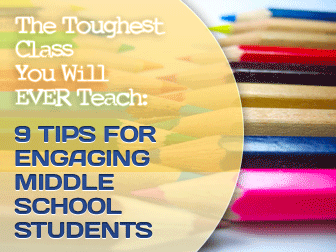9 Simple Tips for Keeping Your Students Motivated (Part One)


Nonetheless, what does a teacher do when her students are too young to think like adults but are trying their hardest to escape childhood? This is the question that faces every middle school teacher. The awkward age that ranges from around 11 until 15 is a challenge for even the best of teachers, but there is hope. Here are some teacher-tested tips for the middle school teachers out there that will help you work with your students’ strengths and minimize their struggles.

Kids at that difficult middle school age are often brimming with energy, even in inappropriate moments. To harness that energy in a constructive way, try using physical games that include a language element. The physical exertion will tame the middle schoolers’ energy enough so they can sit and listen and the language tie in will ensure you don’t feel like you are wasting valuable classroom time. Try games like Simon Says, which require your students to listen for directions before they move. See ‘TPR Tricks: 5 Fabulous Ways to Use Total Physical Response in the ESL Classroom’.
Talking can be a high priority for kids in the middle school age group, especially for girls. Though second language students may not be as chattery as native speakers, kids will still benefit from a chance to talk in class. Make sure your lesson plans always include questions for discussion. You may need to give specific questions for your students to cover rather than giving simple directions to simply discuss, but you will find that middle schoolers have opinions and they appreciate a chance to share them.
Even though kids in the middle school age range are trying to mature out of their childhoods, being a kid is still a large portion of who they are, and encouraging creative expression through artistic elements will add an element of fun to your classroom they are sure to appreciate.
Preteens experience a lot of brain development, but in middle school most students think in very concrete terms. They often cannot understand intangible concepts, so the more concrete examples you give during your instruction, the more effective your teaching will be. If you are trying to teach something abstract, try to explain it in as concrete terms as you can to help your students understand, and give lots of chances for students to put theoretical knowledge to practical use.
Object lessons can be an effective way to make an abstract lesson more concrete. Think of ways you can teach a concept through an object lesson, and check online for successful object lessons other teachers have used.
Not every traditional or even successful lesson plan will work well with middle school students. Be flexible and willing to change up even the lessons that have worked for you in the past. Because your middle school students have different needs than children or adult students, you should always be willing to tailor your plans to meet those needs.
Everyone wants to feel as though he is successful at his work, and middle school students are no exception. Celebrating the small victories and accomplishments of your students will help them feel motivated and will inspire them to deepen their linguistic educations.
Middle school students are like children in that they are learning how the world works. Encourage your students to satisfy their curiosity about language as they learn. Allowing your students to ask any questions, and not berating them for it, will help your students get excited about learning. Then use this excitement to show them that they can be successful language learners.
The more you give your students respect, the more likely they are to return the gesture. Avoid talking down to middle school students, listen when you ask their opinions and talk to them like they deserve respect, and you will find your students are more responsive and engaged in class.
By planning lessons to meet the needs of your middle school students and being flexible with your time and activities, you will be proud of what great students your middle schoolers have become.
Are you a middle school ESL teacher? Share with us your tips for effectively teaching middle school students below.